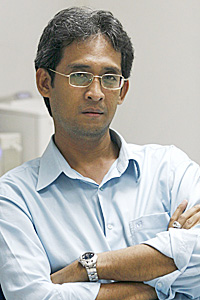
After the Thai Raksa Chart (TRC) Party submitted its nomination of Princess Ubolratana as a sole prime ministerial candidate to the Election Commission (EC) last Friday morning, Prime Minister Prayut Chan-o-cha at first looked almost hopeless. As a prime ministerial candidate himself, he obviously has an eye on reclaiming power after the upcoming general election on March 24.
But the military regime leader’s hopes must have been rekindled about 13 hours later following the release of a royal command stating that the TRC's conduct was “highly inappropriate”.
The EC on Monday endorsed 69 prime ministerial candidates of 45 parties including Gen Prayut, who was nominated by the Palang Pracharath Party (PPRP). However it disqualified the TRC’s nomination of the princess.

Soonruth Bunyamanee is editor, Bangkok Post.
The nomination almost put Gen Prayut and the PPRP in checkmate. But such a misstep now makes the TRC vulnerable to dissolution. Meanwhile, Gen Prayut has become a frontrunner in the poll based on new rules and regulations under the current constitution, and a set of election laws designed by the lawmakers appointed by his regime.
The TRC's attempt to trigger a “political earthquake” has arguably even won him more public sympathy and thus served his cause.
The PPRP is not expected to win the poll in terms of MP seats. But its prime ministerial nomination has a high chance of winning the parliamentary vote, thanks to a constitution that allows 250 senators, selected by the military regime, to vote for a prime minister.
Since the EC’s endorsement of his candidacy on Monday, Gen Prayut has officially become a contestant. As a result, his regime and the government have inevitably become stakeholders in the election.
Any measures and public policies implemented by the government in the lead up to the poll could drum up more popularity for Gen Prayut and the PPRP, giving them an advantage over the other parties and candidates. This is deemed a conflict of interest.
If this were a democratic regime, the government would have taken a caretaker role once the election date was set.
Under the current charter, a caretaker government is prohibited from implementing policies that will be binding on the next cabinet, appointing or transferring government officials, giving approval for expenditure of funds which will have major implications, or utilising state resources in a way that could influence an election.
The spirit of the law aims to prevent conflicts of interest since a caretaker government usually represents a political faction contesting the poll.
However, the constitution specifically allows Gen Prayut and his government to stay in office with full administrative power until a new elected government is sworn in, likely in June.
From now until then, many large projects and procurement schemes worth hundreds of billion of baht are lining up as they await approval from the government. The Prayut administration seems determined to rush through these projects, even though they should have been left for the next government to handle.
The projects include the purchase of 38 aircraft from Thai Airways International and bids for additional phases of the Thai-Sino high-speed train project.
Another example would be the high-speed railway project connecting three major airports, in which a Charoen Pokphand Group (CP)-led consortium offered the best price but more negotiations are required.
Others include: bids for Bangkok’s 70-billion-baht Orange Line mass-transit project, bids for eight more inter-provincial double-track railways, City Hall’s planned procurement of 2,700 hybrid and EV buses, the planned purchase of 14 VT-4 tanks from China, the construction of a second terminal at Suvarnabhumi airport, bandwidth auctions for the 5G spectrum, and bids for duty-free licences at Thai airports.
There is apparently an attempt to accelerate approval for these projects, even though most will be passed over to the new government, probably within the next four months.
The Prayut government’s handling of these projects is thus highly inappropriate.
There are several reasons why the government should leave these projects to a new administration.
First, the regime took power via a military coup without public consent.
Second, its approval of these projects will make the poll an unfair competition.
This government has also taken flak for failing to tackle corruption.
The latest Corruption Perceptions Index by Transparency International confirmed this as in a list of 180 countries, Thailand fell to 99 from 96 in the 2018 index. As a result, it should refrain from handling such mega-projects that involve hefty expenditures from the state budget.
If the PPRP wins the election, it will do everything it can to restore Gen Prayut to power and proceed with these capital-intensive projects.
But for now, the government lacks the political legitimacy to sign off on them.
